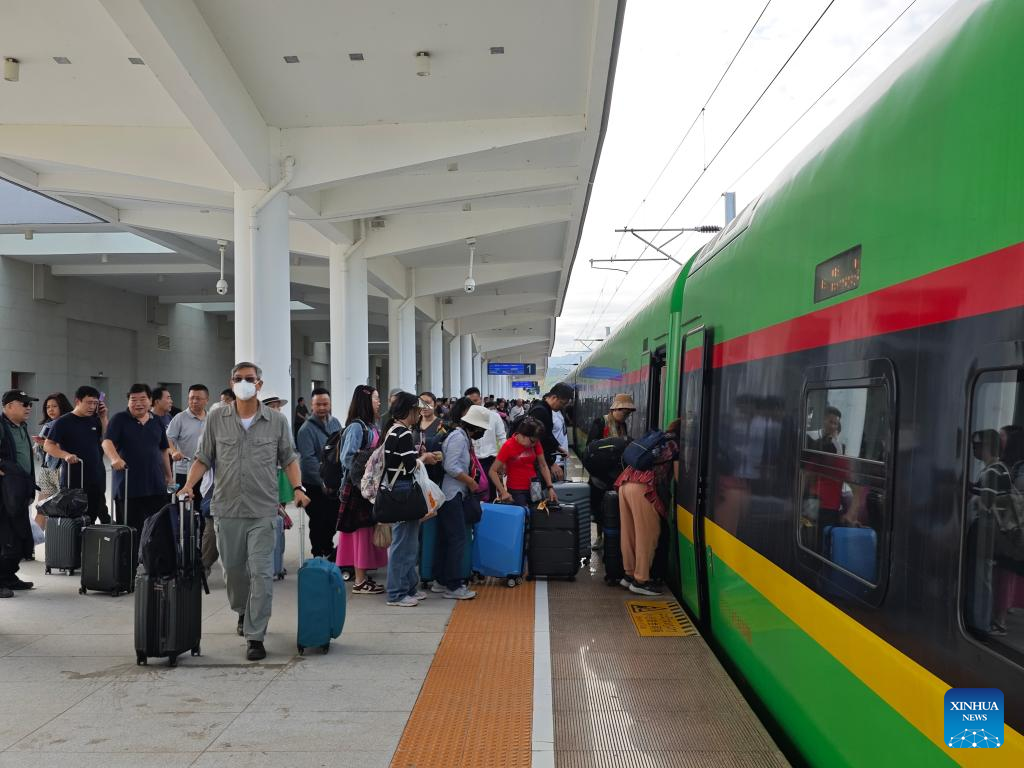Feature: China-Laos Railway boosts local tourism, employment

Passengers queue at Luang Prabang railway station of the China-Laos Railway in Luang Prabang, Laos, Dec. 4, 2023. (Xinhua/Lu Yun)
VIENTIANE, Dec. 5 (Xinhua) -- At the age of 20, Lao girl Bounmee already became the breadwinner for her family. As the chief conductor of a bullet train on the China-Laos Railway, she now earns a salary way more than her peers.
"My parents are so proud of me," she said in fluent Chinese. After high school, she went to study Chinese in the hope that language skills could help her land a high-paying job, and the launch of the China-Laos Railway on Dec. 3, 2021 helped her hard work pay off.
Two years into operation, the railway has created jobs for thousands of Laotians like Bounmee, and brought tangible benefits to local tourism, supporting the country's post-pandemic growth.
Over the past two years, the railway has handled 24.2 million passenger trips and transported 29.1 million tons of cargo, according to China's railway operator. The monthly passenger trips handled by the railway have grown significantly from more than 600,000 at the beginning of its operation to more than 1.1 million now.
According to the Laos-China Railway Co., Ltd. (LCRC), a joint venture based in Lao capital Vientiane responsible for the operation of the railway's Lao section, the demand for the bullet trains are beyond original expectations, and the company is stepping up efforts to tailor to Lao people's ever-increasing and diversifying needs.
For instance, in line with the increasing demand for high-end services, the LCRC added business-class seats in new trains, facilitating better experiences along the journey.
"We want to bring quality products and services to Laos, and we want Lao people to share the benefits during the process," a LCRC operation manager said.
The railway has contributed to the recovery of tourism industry in Laos, which is a crucial driver for growth but was badly hit by the COVID-19 pandemic. The bullet trains became a much-needed boost, as it greatly cuts travel time between major cities, attracting tourists from home and abroad.
At Luang Prabang, a popular tourist destination, passengers were lining up to take the bullet trains. Thanks to the China-Laos Railway, travel time between Vientiane and Luang Prabang was cut to about 2 hours, compared with more than 6 hours of driving.
"We chose Laos as the destination because it's convenient to travel around via the trains," said Minjung Choi, a tourist from South Korea, who was on a five-day visit to Laos with her friend.
"It's a clean, safe, and efficient way to travel, and it's not too hard for us to buy the tickets," she said.
More than 2.4 million foreign tourists visited Laos in the first nine months of 2023, up by 285 percent from a year ago, according to statistics from the Lao Ministry of Information, Culture and Tourism.
Looking forward, the LCRC said it hopes that together with the development of the railway, the skills of local employees like Bounmee could also improve so that more management positions could open to local people, supporting high-quality employment.
For Bounmee, who now has a Chinese name "Xiao Li," meaning "little beauty" in Chinese, that means brighter career prospects and a shining future ahead.
"I hope I can travel to China to learn more technical skills and see with my eyes of the beautiful country," she said.

Chief conductor Bounmee works on a bullet train on the China-Laos Railway in Laos, Dec. 4, 2023. (Xinhua/Lu Yun)
Photos
Related Stories
- Lao gov't, Chinese firm cooperate to reduce greenhouse gas emissions
- Commentary: China-Laos Railway, flagship Belt and Road project for regional connectivity, common development
- China-Laos Railway boosts regional economy two years after launch
- China-Laos Railway brings booming tourism, business opportunities
- BRI cooperation brings numerous fruitful results, improving people's livelihood in Laos
Copyright © 2023 People's Daily Online. All Rights Reserved.









